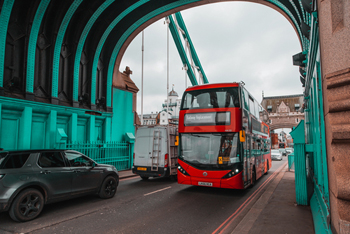Campaigners have criticised the chancellor’s decision to maintain the freeze in fuel duty, with the bus industry accusing him of putting ‘the prime minister’s green recovery’ at risk.
The criticism comes as research confirms that traffic is currently close to pre-pandemic levels.

Traffic on London's Tower Bridge, January 2021
Graham Vidler, chief executive of the Confederation of Passenger Transport, which represents bus and coach firms, said: ‘The decade long freeze in fuel duty has led to 200 million fewer bus journeys, an additional three million tonnes of CO2 being emitted, and increased congestion which cost the UK economy nearly £7bn in 2019.
‘By failing to end the fuel duty freeze, the Chancellor has put at risk the prime minister’s green recovery and missed the chance to take a bold step towards positioning the UK as a global climate leader in advance of the COP26 summit later this year.’
Paul Tuohy, chief executive of Campaign for Better Transport, said freezing fuel duty for the eleventh year in the same week that rail fares went up ‘sends the wrong signals about transport choices’.
He said: ‘These two policies put transport carbon emission targets even further out of reach and will worsen air pollution in our towns and cities.
‘The Government cannot continue to avoid the inevitable; it must look to reform the old fashioned and outdated vehicle taxation system and replace it with a road pricing scheme that is fairer to everyone and better supports the Government's green ambitions. If the Government is serious about a green recovery, it must also to do more to support public transport, including introducing flexible rail tickets as a matter of urgency to help people return to work when the time is right.’
Drivers' groups welcomed the chancellor’s decision ‘not to rock the fuel duty boat’. The RAC’s head of policy, Nicholas Lyes, said: ‘Many drivers see their cars as a safe way to carry out essential journeys and believe having access to a vehicle is even more important as a result of the pandemic.
‘If the Chancellor had raised fuel duty, he could have risked choking any economic recovery as it would have led to increased costs for consumers and businesses.’
Colin Wood, regional chief executive - Europe at AECOM, welcomed the announcement of eight Freeports but also suggested that the chancellor had sent the wrong message on environmental issues.
He said: ‘With the UK hosting the COP26 summit in November and the pledge of a green industrial revolution, this was an opportunity to show great leadership in tackling the climate crisis. Whilst there are mentions of retrofitting building stock, investment in EV charging in our town centres and investments in offshore wind, hydrogen and carbon capture technology, I feel much of this is what we “should do”, rather than what we “could do” if we want to send a definitive message to the rest of the world.’
Mr Wood said he was ‘glad to see the Government is recognising the importance of investing in our towns and high streets’.
He added: ‘The pandemic has irrevocably changed the way that we work and travel. I strongly believe that we will now see a trend of more local journeys, more local commerce and fewer days commuting for many of us. To maximise the social and economic benefits of this we must invest in the redevelopment of brownfield sites, transport and green spaces close to our high streets and towns.’
Andrew Carter, chief executive of the Centre for Cities, criticised the chancellor’s vision for economic recovery as too centralised.
He said: ‘Governing directly from the Treasury – whether in London or Darlington – will not level up the country. Rather than moving civil servants out of Whitehall, the Government should be moving powers and money out and handing them over to local leaders who understand their areas and the challenges that people face.’
Philip Dunne MP, chairman of the Environmental Audit Committee, described the £20m for investment in port infrastructure for offshore wind, as ‘a positive step forwards [but] a drop in the ocean’.
He added: ‘It is welcome that the National Infrastructure Bank will be charged with helping to deliver net-zero carbon infrastructure, but its mandate must also prioritise investment in measures to restore nature and protect wildlife.’
Mr Dunne also described the expanded remit of the Bank of England as ‘a globally significant step in the transition to zero carbon’. But he added: ‘As this is the year when the UK hosts COP26 and the eyes of the world are on him, he has missed opportunities in other areas to put his stamp on efforts to grow back greener.’
Register now for full access
Register just once to get unrestricted, real-time coverage of the issues and challenges facing UK transport and highways engineers.
Full website content includes the latest news, exclusive commentary from leading industry figures and detailed topical analysis of the highways, transportation, environment and place-shaping sectors.
Use the link below to register your details for full, free access.
Already a registered? Login